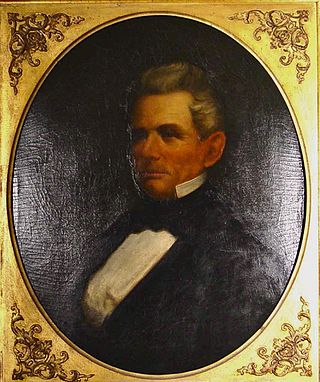Related Research Articles

Andrew Barry Moore was the 16th Governor of the U.S. state of Alabama from 1857 to 1861 and served as Governor at the outbreak of the American Civil War.

John Gayle was the 7th Governor of Alabama,a United States representative from Alabama,a justice of the Supreme Court of Alabama and a United States district judge of the United States District Court for the Middle District of Alabama,the United States District Court for the Northern District of Alabama and the United States District Court for the Southern District of Alabama.

The United States District Court for the Middle District of Alabama is a United States district court in the Eleventh Circuit.

The United States District Court for the Northern District of Alabama is a federal court in the Eleventh Circuit.

Charles Allen Graddick Sr.,was the 42nd attorney general of Alabama from 1979 to 1987. He later served as a judge of the 13th Judicial Circuit Court of the U.S. state of Alabama.
The Supreme Court of Appeals of West Virginia is the state supreme court of the state of West Virginia,the highest of West Virginia's state courts. The court sits primarily at the West Virginia State Capitol in Charleston,although from 1873 to 1915,it was also required by state law to hold sessions in Charles Town in the state's Eastern Panhandle. The court also holds special sittings at various locations across the state.

The Supreme Court of Alabama is the highest court in the state of Alabama. The court consists of a chief justice and eight associate justices. Each justice is elected in partisan elections for staggered six-year terms. The Supreme Court is housed in the Heflin-Torbert Judicial Building in downtown Montgomery,Alabama.

Roy Stewart Moore is an American politician,lawyer,and jurist who served as chief justice of the Supreme Court of Alabama from 2001 to 2003 and again from 2013 to 2017,each time being removed from office for judicial misconduct by the Alabama Court of the Judiciary. He was the Republican Party nominee in the 2017 U.S. Senate special election in Alabama to fill the seat vacated by Jeff Sessions,but was accused by several women of sexually assaulting them while they were underage and lost to Democratic candidate Doug Jones. Moore ran for the same Senate seat again in 2020 and lost the Republican primary.

Sue Bell Cobb is an American jurist and former chief justice of the Alabama Supreme Court,the first woman to hold that office in Alabama's history. In 2018 she unsuccessfully ran for governor of Alabama losing in the primary to Tuscaloosa mayor Walt Maddox receiving 30 percent of the vote compared to his 52 percent.

Kay Ellen Ivey is an American politician who is the 54th governor of Alabama,serving since 2017. Originally a conservative Southern Democrat,Ivey became a member of the Republican Party in 2002. She was the 38th Alabama state treasurer from 2003 to 2011 and the 30th lieutenant governor of Alabama from 2011 to 2017.

John McKinley was a United States Senator from the state of Alabama and an associate justice of the Supreme Court of the United States.
Same-sex marriage has been legal in Alabama since June 26,2015,in accordance with the U.S. Supreme Court's ruling in Obergefell v. Hodges. Not all counties immediately complied with the ruling,copying behavior from the civil rights era when they had refused to perform interracial marriages. A year after the Supreme Court ruling,twelve counties would either issue licenses to no one or only to opposite-sex couples. By 2017,this number had dropped to only eight counties,with all eight refusing to issue licenses to anyone. In May 2019,the Alabama Legislature passed a bill replacing the option that counties issue marriage licenses and perform marriage ceremonies with the requirement of counties to record marriage certificates. Subsequently,all counties complied and announced on August 29,2019 that they would record marriage certificates for interracial and same-sex couples. Previously,Alabama had banned the licensing of same-sex marriages and the recognition of such marriages from other jurisdictions by executive order in 1996,by statute in 1998,and by constitutional amendment in June 2006.

The Alabama Court of Civil Appeals is one of two appellate courts in the Alabama judicial system. The court was established in 1969 when what had been one unitary state Court of Appeals was broken into a criminal appeals court and a civil appeals court. The unified Court of Appeals had been operative since 1911. The initial court's members were appointed by Governor Albert P. Brewer. The court is currently housed in the Alabama Judicial Building in Montgomery,Alabama. Judges on the court are elected in partisan elections on staggard six year terms. Today,the court's membership is all Republican but it was composed of just Democrats between 1969 and 1989. At that time,Republican Governor Guy Hunt appointed Robert J. Russell to the bench on April 16,1989 thus becoming the first Republican on the court. Ironically,Russell was defeated for re-election in 1990 but was again appointed almost immediately to another vacancy on the court by Governor Hunt in January 1991.

The Alabama Court of Criminal Appeals is one of two appellate courts in the Alabama judicial system. The court was established in 1969 when what had been one unitary state Court of Appeals was broken into a criminal appeals court and a civil appeals court. The unitary Court of Appeals had been operative since 1911. The Court of Criminal Appeals is the linear descendant of the unitary Court of Appeals as its predecessor judges were automatically assigned to the Court of Criminal Appeals in 1969. At that time the court only had three judges,but that was changed to five in 1971. The court is housed in the Heflin-Torbert Judicial Building in downtown Montgomery,Alabama.

Robert Julian Bentley is an American former politician and physician who served as the 53rd governor of Alabama from 2011 until 2017 upon his resignation following his arrest after a sex scandal involving a political aide. A member of the Republican Party,Bentley was elected governor in 2010 and re-elected in 2014.

Luther Johnson Strange III is an American lawyer and politician who served as a United States Senator from Alabama from 2017 to 2018. He was appointed to fill that position after it was vacated by Sen. Jeff Sessions upon Sessions's confirmation as U.S. Attorney General.
Jacquelyn L. "Lyn" Stuart is an American jurist and the first Republican woman Chief Justice of Alabama and the second woman to hold the office. She was first appointed by Alabama Governor Kay Ivey as "acting" Chief Justice of the Supreme Court of Alabama on May 6,2016,when her predecessor,Roy Moore,was suspended from office. At the time of her initial appointment,she had been an associate justice of the Alabama Supreme Court since 2001,which was the longest tenure for any Republican in the Court's history. She had been thrice elected as an associate justice in 2000,2006,and 2012.
John Crawford Anderson was an associate justice of the Supreme Court of Alabama from 1904 to 1914,and then Chief Justice from 1914 until his death in 1940.
Brady Eutaw Mendheim Jr. is an American jurist who has served as an associate justice of the Supreme Court of Alabama since 2019.
References
- 1 2 3 4 5 Taylor, Stephanie (March 13, 2016). "Judge Chuck Malone retires from Tuscaloosa County Circuit Court". www.tuscaloosanews.com. Retrieved June 19, 2017.
- 1 2 Accardi, Marian (August 20, 2011). "New Alabama Chief Justice Chuck Malone sees changes coming for courts". The Huntsville Times .
